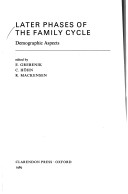International Studies in Demography
2 total works
Whilst demographers and sociologists have previously studied the formation of new families through marriage and the birth of children, much less attention has been devoted to the later phazes of the life courses of families, such as the dissolution of marriages through widowhood and divorce, remarriage, kinship networks, the living arrangements of the elderly, and the reduction in the size of household caused by children leaving the parental home. The papers in this book, first delivered at a seminar organized by the International Union for the Scientific Study of Population held in Berlin, describe these processes and draw on empirical material from different countries including Britain, France, Belgium, Germany, Hungary, the United States and Australia.
This volume in the International Studies in Demography series examines the effects of rural population growth in developing countries on food production, covering such topics as forecasts of global output of food, technological progress in agriculture, choice of agricultural system, the influence of population density on the evolution of market institutions, the role of the frontier as a safety valve, population growth and access to land, and rural proletarianization. The book takes a close look at the impact of population growth where it is believed to matter most - in the rural areas of developing countries.

